0% Complete

نویسندگان :
کلمات کلیدی :
چکیده :
لیست مقالات بایگانی شده
مهدی غفاریان
حسن شایق - مجتبی طواری - جابر ابراهیمی
سید امید رادی - مهرداد فارسی مدان
محمدرضا فرقانی - شریفه السادات میرخلف - یعقوب صابری
Fatemeh Alimoradi - Zahra Alimoradi - S. Mohammadali Zanjani - Ghazanfar Shahgholian
مجتبی طواری - جابر ابراهیمی - حسن شایق
Mahdie Sanjaran - Hamid Mahmoodian
Mohammadreza Shirzad tabrizi


